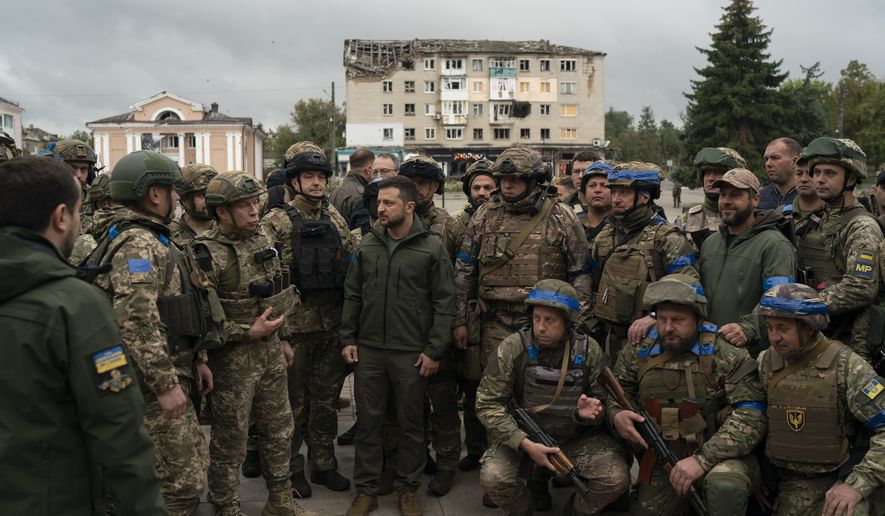Ukrainian President Volodymyr Zelenskyy on Wednesday marked his military’s highly successful counteroffensive with a surprise visit to Izium, the front-line city that troops recaptured last weekend after months of Russian occupation.
Izium, like Kharkiv and other key cities in eastern Ukraine, saw Russian forces withdraw amid Ukrainian troops’ highly coordinated counterattack. The rout of Russian forces has radically transformed the war over just the past week and delivered badly needed momentum to Ukraine’s army. It has also lifted hopes in the West that a clear, total defeat of the Russian invaders may be within reach.
But Mr. Zelenskyy’s visit to Izium, which had been a major logistical supply node for invading Russian troops, was bittersweet. The city, he said, has been destroyed by Russian attacks. He compared it to other cities such as Bucha, the village near Kyiv where occupying Russian soldiers committed atrocities last spring.
“The view is very shocking, but it is not shocking for me,” Mr. Zelenskyy told reporters in Izium. “Because we began to see the same pictures from Bucha, from the first deoccupied territories … the same destroyed buildings, killed people.”
Ukrainian prosecutors said they have found at least six bodies with evidence of torture in Kharkiv. Ukrainian officials elsewhere have made similar claims, but they were not immediately verified by reporters on the ground.
Despite Ukraine’s recent successes on the battlefield, there is little sign that Moscow is prepared to surrender. Kremlin officials have stressed this week that their country’s “special military operation” in Ukraine will continue. Foreign officials say their private conversations with Russian leaders have offered little hope that peace is on the horizon.
SEE ALSO: Ukraine faces new dilemma: How far and how fast to press advantage over Russia?
“Unfortunately, I cannot tell you that the realization has grown over there by now that this was a mistake to start this war,” German Chancellor Olaf Scholz said Wednesday after a phone call with Russian President Vladimir Putin.
New details emerged Wednesday that suggest Mr. Putin was determined to carry out his war in Ukraine even if Kyiv provisionally agreed to some of his demands.
Citing three sources close to Russian leadership, Reuters reported Wednesday that a Russian envoy to Ukraine had struck a deal that would’ve kept Ukraine out of NATO — a key demand of Moscow in the run-up to its Feb. 24 invasion. But Mr. Putin rejected that deal, Reuters said, arguing that it did not go far enough.
The Kremlin rejected the report.
“That has absolutely no relation to reality,” Kremlin spokesman Dmitry Peskov told Reuters. “No such thing ever happened. It is absolutely incorrect information.”
As Ukraine presses ahead, U.S. officials hailed the success but cautioned against proclaiming that the tide of the war has turned.
“It’s clear the Ukrainians have made significant progress. But I think it’s going to be a long haul,” President Biden said.
Top Republicans in Congress pressed the president to seize the moment and dramatically increase the flow of American weapons to Ukraine at a pivotal moment in the fight. Mr. Zelenskyy’s government has been making frequent and impassioned pleas for more firepower from U.S. and NATO countries.
“Our Ukrainian friends may still face a long, hard struggle to achieve victory as they define it. But Western countries can help by stepping up the pace of our collective assistance,” Senate Minority Leader Mitch McConnell said.
“The Ukrainians need more of the weapons we’ve been giving them,” the Kentucky Republican said.
Pentagon officials have stressed in recent days that the pace of U.S. weapons deliveries will not slow down, though there has been little clear indication from the Biden administration that a significant increase in those deliveries is on the immediate horizon.
Beyond Ukraine’s recent territorial gains and new momentum, Western intelligence officials say Russia faces other major problems there.
The British Ministry of Defense said Wednesday that it is “highly likely” Moscow has begun to deploy Iranian-made drones in Ukraine. Ukrainian officials claimed Tuesday they shot down a Shahed-136 drone during the ongoing counteroffensive campaign.
The use of those Iranian drones, British officials said, suggests Russia is running short on its own equipment.
“Russia is almost certainly increasingly sourcing weaponry from other heavily sanctioned states like Iran and North Korea as its own stocks dwindle,” British intelligence officials wrote in a Twitter post. “The loss of a Shahed-136 near the front lines suggests there is a realistic possibility that Russia is attempting to use the system to conduct tactical strikes rather than against more strategic targets farther into Ukrainian territory.”
• This story is based in part on wire service reports.
• Ben Wolfgang can be reached at bwolfgang@washingtontimes.com.




Please read our comment policy before commenting.